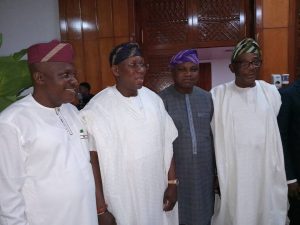
The Nigerian Senate was on Thursday jolted by a fresh wave of defections as four senators formally announced their exit from the opposition Peoples Democratic Party (PDP) and joined the ruling All Progressives Congress (APC). The defectors include Senators Francis Adenigba Fadahunsi (Osun East), Fadeyi Oluwole Olubiyi (Osun Central), Etim Aniekan Bassey (Akwa Ibom North-East), and Ekong Samson Apkan (Akwa Ibom South).
The defections were announced on the floor of the Senate during plenary, with the President of the Senate, Godswill Akpabio, reading the individual letters addressed to his office. Each lawmaker cited serious internal crises within the PDP, ranging from irreconcilable differences to divisions within the party at both national and state levels.
Senator Francis Fadahunsi, a ranking member representing Osun East, stated in his resignation letter that he could no longer remain in the PDP due to “irreparable and irreconcilable differences” and “protracted legal battles” that had bedevilled the party following the 2023 general elections. His letter, dated June 12, 2025, was originally submitted to the PDP Ward Chairman in Obokun Local Government Area of Osun State, marking the end of a long chapter in the senator’s political career with the party.
Fadahunsi’s move is legally backed by Section 68(1)(g) of the 1999 Constitution of the Federal Republic of Nigeria (as amended), which permits an elected lawmaker to retain their seat if they leave their party due to division or factional crisis. He also cited wide consultations with political associates, family, and supporters before arriving at the decision.
Closely following him is Senator Fadeyi Oluwole Olubiyi, representing Osun Central. Although the full content of his defection letter was not read aloud, sources confirmed that Fadeyi’s exit was largely triggered by internal defeat and alienation within the Osun PDP. In recent months, Fadeyi had reportedly lost strategic control of local party structures and was growing increasingly disillusioned with what he considered a lack of inclusion by the state leadership.
His defection, just like Fadahunsi’s, raises broader questions about possible emerging discontent within Osun PDP ranks.
The fact that both senators from Osun State defected on the same day has sparked political speculation.
The move may be more than coincidental and could indicate an underground current of resistance against Governor Ademola Adeleke’s leadership style.
Though Governor Adeleke remains firmly in the PDP, the loss of two federal lawmakers may be interpreted as a subtle message to his camp either to realign or brace for internal revolt ahead of the next election cycle. It is also widely believed that both senators may be positioning themselves in expectation of potential political changes within the state, or are seeking closer access to federal influence and resources under the APC-led government.
From Akwa Ibom State, Senators Etim Aniekan Bassey and Ekong Samson Apkan also announced their defection from the PDP. Senator Etim Bassey, representing Akwa Ibom North-East, explained that his decision followed the recent defection of Akwa Ibom State Governor, Pastor Umo Eno, to the APC, as well as wide consultations with his constituents.
According to his letter, he believed that aligning with the new political reality in the state would ensure more effective collaboration for development.
He thanked the PDP for the platform it had given him in the past but insisted that the prevailing political shift necessitated a realignment.
Senator Ekong Apkan, representing Akwa Ibom South, delivered a more pointed critique of the PDP, lamenting that the party had descended from its once towering height due to a collapse of internal structure, ideology, and cohesion. According to Apkan, the PDP’s disunity made it impossible for him to continue providing the level of representation his constituents expected.
He described the APC as a “watershed platform” capable of advancing national development and local empowerment. Both Bassey and Apkan expressed optimism that the APC’s Renewed Hope Agenda would bring better dividends to their constituencies.
The defections of the two Akwa Ibom senators mark a significant political realignment in a state long regarded as a PDP stronghold. With Governor Umo Eno and two senators now in the APC, the political equation in Akwa Ibom is shifting rapidly in favour of the ruling party.
Receiving the defectors, Senate President Godswill Akpabio acknowledged the development and assured that the Senate would remain focused on national development irrespective of party lines.
He welcomed the senators into the APC fold and urged them to continue to deliver effective representation to their constituents.
The implications of Thursday’s defections are profound. With the APC expanding its numbers in the upper chamber and making inroads into traditionally opposition-held states, the balance of power in the Senate is tilting further in favour of the ruling party.
This trend could have lasting impacts on legislative decision-making and the political configuration leading up to the 2026 governorship elections and the 2027 general polls.
Though the PDP has not officially responded to the defections, party insiders say emergency meetings may be convened to assess the fallout and possibly halt further exits.
For now, the message is clear: the political ground is shifting, and both Osun and Akwa Ibom are becoming key battlegrounds in Nigeria’s evolving political landscape.
